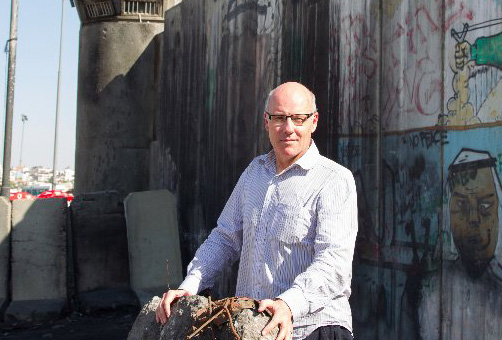FRESH AIR
Colin Rubenstein’s complete response to the Guardian’s queries about claims by John Lyons
August 1, 2017

On Saturday, the Guardian Australia published an article by Amanda Meade highlighting claims against AIJAC made by Australian reporter John Lyons in his new book, Balcony over Jerusalem, and including responses from AIJAC’s Colin Rubenstein to some of his claims. For the sake of clarity and accuracy, we include below exactly what Ms. Meade asked AIJAC last Friday, and Colin Rubenstein’s reply to her in full:
Amanda Meade’s email request, 28 July 2017 at 11:43:27 am:
Dear Dr Rubenstein,
In his book Balcony over Jerusalem John Lyons makes several claims about the lobbying efforts of the AIJAC.
He recounts that you spoke to editors at The Australian regularly and suggested articles that Nick Cater should run when he was editor of the Weekend Australian.
He quotes Chris Mitchell: “I got upset with Colin when he rang me and attacked [Australian reporter] Elizabeth Wynhausen as ‘a self-loathing Jew’. I thought it was inappropriate for him to be making that kind of comment about one of my staff. For some time after that I stopped taking his calls.”
Lyons also says the AIJAC published a dossier critical of ABC Middle east correspondent Sophie McNeill in 2015, and that the lobby wields too much influence over journalists generally.
We are writing about some of these points and wanted to give you a chance to respond.
Kind regards, Amanda Meade
Colin Rubenstein’s complete response, 28/07/2017, 1:42 PM:
Hi Amanda,
In response to your query, yes of course, I have sometimes spoken to editors in the course of our work, including at the Australian and including Nick Cater. I have probably on occasion mentioned articles I had seen that he might find of interest. I find it hard to see in what way this is nefarious or improper.
I certainly did speak to Chris Mitchell about [Australian reporter] Elizabeth Wynhausen in 2006, and specifically about a piece which read like a “hit job” on both AIJAC and myself, while evoking all too familiar caricatures. I felt entitled to some right of reply – which I received in the form of a letter.
I do not recall ever calling her a “self-loathing Jew” and that does not sound like the kind of terminology I would use. As for Chris Mitchell’s claim about ceasing to take my calls, I must say I was not aware he felt that way at the time – which shows how infrequently I actually spoke to him.
We did put together a public document explaining why we thought Sophie McNeill – who had described herself and has been described by the ABC as an “activist” filmmaker associated with the Palestinian cause, and who had spoken at an event promoting boycotts against Israel – was an inappropriate choice for Middle East correspondent for the taxpayer funded ABC, with its statutory obligations of impartiality. Again, I don’t see why this is improper – even if you choose to label it a “dossier.”
In other words, like many groups in Australian society, we engage politicians, the media and others of influence to promote our point of view. We do critique journalists and media stories when we see factual errors, lack of context, or unprofessionalism on issues we care about, ask for rights of reply on other occasions, and also sometimes make formal complaints when we believe published standards have been violated.
Of course, no one likes to be criticised or held to account, including journalists. John Lyons’ work has been subject to frequent criticism by us – and I believe that is the source of his current claims. Sadly, rather than address our critiques, he prefers to shoot the messenger and indulge in conspiratorial thinking about how we are “too powerful.”
Everything we do – critiquing media stories; contacting editors, politicians and journalists and explaining our point of view to them; writing our our letters and op/eds; making complaints – are absolutely normal elements of deliberation and debate in a democratic society.
Moreover, the claim that such activities give us “too much influence” implies that something should be done about our ability to do them – even though they are part of our basic rights as participants in a liberal democratic society. I would call on those who oppose our views, including Mr. Lyons, to engage with different views in a democratic, tolerant and constructive spirit, rather than demand, as he appears to be doing, that those who disagree with him be silenced or suppressed.
best,
Dr. Colin Rubenstein AM
Executive Director
AIJAC
Tags: Australasia
RELATED ARTICLES

US Middle East strategy amid regional instability: Dana Stroul at the Sydney Institute

Antisemitism in Australia after the Bondi Massacre: Arsen Ostrovsky at the Sydney Institute





















